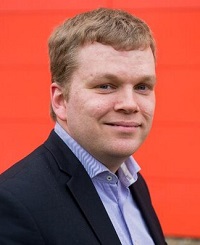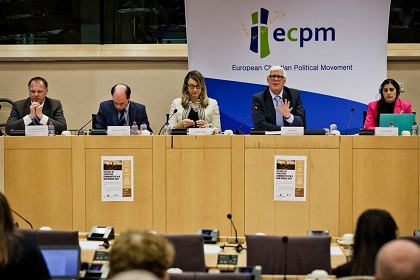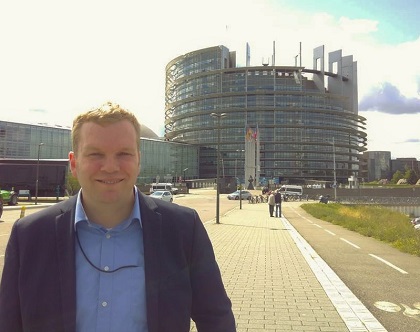“Christians should be in politics for impact, not for power”
Auke Minnema, General Director of the European Christian Political Movement, says young Christians should be encouraged to engage with society following the example of Jesus Christ and many others in the Bible. “We have a message, and we should be salt and light”.
BRUSSELS · 06 APRIL 2018 · 18:44 CET

Auke Minnema (Netherlands) is the new General Director of the European Christian Political Movement, a platform that brings together people and parties committed to an active Christian faith.
In an interview with Evangelical Focus, he speaks about the challenges and opportunities Christians face in places like the European Parliament, where the future of Europe’s societies is discussed.
What values and social issues should be a priority for Christians right now? How do Christian politicians support each other? How can people in churches across Europe pray for Christians working in the political field? These are some of the topics Auke Minnema commented on. To listen to the audio of the interview, find the media player at the bottom of these page.

Answer. Thank you, it is an interesting new role and it were interesting weeks with a lot of new things. I really have enjoyed myself, it’s really good to see that there are so many Christian people involved in politics in Europe. I am pretty impressed.
Q. How would you summarise the vision of the European Political Christian Movement (ECPM)?
A. Our vision is to promote the Christian relational worldview. This is the basis, we believe, for a just, free and stable society. We want to gather all the Christian politicians in Europe to work together for a more Christian Europe, so to say, a Europe that is based on Christian values.
Q. What kind of political parties are represented in the movement? Conservatives, leftists, liberals…? Give us some examples.
A. We have members basically all over Europe. The main common denominator is that they are all active Christians in politics. They are not cultural Christians, but really active in their faith. We mainly have them on the more conservative side, in the centre-right, but there are also some people on the left side.
But we gather around the fact that we are Christians, not that much around a certain political theology. The fun fact is that, as we gather as Christians, this brings us politically also closer to each other: we share more than what divides us. We call ourselves Christian Democrats, which we are, but we really are Christian believers.
If you look around Europe, we could talk about bigger parties, for example, in the Netherlands, like the Christen Unie (they are in the current government), but also the Dutch Reformed Party. We have member parties in countries like Poland, Romania, in France. Politicians in Germany, Slovakia… We are in many European countries, including the non-EU member states.
Q. Is it a good moment for Christians to be in politics? What kind of influence can Christians have in the European context now?
A. The question is, what is a good moment? I think for Christians it is always a good moment to be in politics. I believe that we are in the world to let our voice to be heard.
Yes, we are in a secularised Europe, especially in Western Europe, but we have always followed the principle that we are there for impact, not for power.
We want to change a lot of things, but we are not aiming for the next European Commission or whatsoever. Obviously, if God blesses and these things happen, we are not running away from it – some of our member parties sometimes join governments. We are ready to have power, but we are not aiming too much for power, we are aiming for impact. We want to bring values into politics which we believe that are good for all the people in Europe. That’s not always easy, but it works.
We have had several issues in which we were able, with our small voice, to change laws and proposals.

Q. What are the areas of policy that you would prioritise as a Christian movement?
A. For example, one of our values is: “A Europe for human dignity”. We are aiming for an economy that works for the people and the planet. We aim for healthy families and healthy marriages. We aim for freedom, security and stability. We are very active in the fight against human trafficking.
And we aim for the EU to be reformed. We are not against the EU but we call ourselves ‘Euro-realists’. The EU in itself is a good thing, but there are huge reforms needed. Obviously, we also fight for preserving Christian culture and heritages.
These are a few areas in which we are active. A lot of people think that Christian politicians are only active in standard ‘Christian’ issues, but we are proud to say that we care for all kind of different things. We have a political program which talks about sustainability, economy, and environment. We are active in the broad spectrum of what happens in politics.
Q. You mentioned that the West of Europe is more secularised than the East. What are the differences you see in the views on ethics or issues like family? Is there a big divide?
A. Yes and no. Recent history divided Europe so much that one can see different speeds, so to say. Eastern Europe was under the pressure of Communism until 1989, whereas in the Western areas people where much freer, and societies developed faster.
A lot of people in the East are much more conservative. This is in part because many people were still Christians there, although officially it was not really allowed in most countries behind the iron curtain. In difficult times, they found their hope in the church and still do so. There are more active Christians in the East now, and they are, as I said, a bit more conservative.
Now, in a way, some countries mostly in the West (Germany, France, Netherlands) are, in a way, imposing their values on the East. And people in the East say: “Wait a second, this is not what we want”. I am afraid that many politicians currently in Europe do not always understand this reality.
Q. Are these differences seen when you compare the European Union with the Council of Europe - which includes more Eastern non-EU countries?
A. Definitely. The Council of Europe is much more conservative, for example, when it comes to Christian values. That is a good thing.
We are using the word “conservative” quite a lot in this conversation. And I have to say that a lot of Christians are conservative but not in the way that liberals would portray us. Christians are not against all reforms or against new things. To be conservative is not necessarily a bad thing, as many people think. Conservative can mean something that is healthy: to consider things and wait to see the different sides before changing policies.
Q. Many Christian experts that are saying that one of the main battles in Europe is freedom of speech, which is closely tied to freedom of religion. And this is not only to protect Christians and people of other faiths, but for the good of all citizens. Do you agree?
A. I don’t know if it is the battle, but it is definitely one of the big battles, yes. We see that increasingly when people don’t want to be “insulted”. We are going from freedom of speech to the “freedom of not being insulted”, and I believe that is a very bad thing. Obviously, no one should be insulted, but the big question is: when are you being insulted and when somebody is just saying what they are allowed to say? Unfortunately, we see that increasingly people are not able to say what they want to say because others might be insulted by that.
In the country I know best, the Netherlands, the railways just announced that they will change their announcements on the train stations. Instead of saying: “Ladies and gentleman”, they will just say: “Dear passengers”, because there might be a 0.5% of the population that would be insulted because they are no defining themselves as a lady or a gentleman. I do understand it in one way, but on the other side, I am just thinking: where are we going? If this is the path we are taking, perhaps next time I will feel insulted because I am not really feeling as a “passenger”. By going in this direction, certain groups become over-privileged above others.
So, yes, freedom of speech is really an important topic now in Europe, and not only for Christians.
Q. From your perspective from Brussels, which pressure groups are the strongest in the European Union right now?
A. That’s a really good question. It really depends on the topic, obviously, every topic has its own lobby group. But in general, I would say that the liberal groups are putting more and more pressure. What we see is that they are fighting for freedom (that is a traditional liberal issue) but, at the same time, they do not define what this freedom is, and therefore restricting a lot of these freedoms.
Again, if we look at the Netherlands, there was a liberal party who proposed that everyone who is a Dutchman automatically should become an organ donor. So, now, you automatically are a donor, unless you say you don’t want to be one (and you register for it to be exempted). This, now, gives the government, in a way, the authority over the human body. I am not necessarily against being a donor, it’s a good thing if somebody dies and by giving your organs, somebody else can live longer and have a good live again. At the same time, I think there needs to be a personal decision, because we are talking about the integrity of the body. In my view, we should not give the government the authority over this. So, instead of giving you a free choice, liberals where here making the choice for you.

Q. In many churches you would here that “politics is a dirty world”. In this context, how would you encourage and train young people to get into politics?
A. I agree, in a way, that politics is dirty. The American thinker Jim Wallis once said that “every budget is a moral document”, and I agree. If you have to make choices and you give a million more to education, you will not be able to spend this money in health care. You have to make choices, and get your hands dirty, so to say.
At the same time, if you read your Bible you will see so many examples of politicians, people who were active for their society. I’m just naming David, but there are so many other examples in the Bible.
Jesus himself encourages us to take care of our neighbour, to take of our neighbourhood, and to do good to our people. There is definitely a role for us, we cannot just stand aside saying “we are in this world and not from this world, therefore we just give to the government what belongs to the government and continue to do our own thing”. No, we are Christians, we have a message, and we should be salt and light.
In my personal opinion, in politics we should witness but we should not preach. But when people nask us: “Why are you in favour or against of this and that?”, we can say: “Because I’m a Christian and I believe that God told us to do this and that, and in the Bible I read about taking care of the poor and the weak, etc.”
I really believe that we, as Christians and especially young Christians, should stand up and fight for our values. Fight for our countries and the European Union to be better.
Q. Do you see young Christians getting excited about this vision?
A. More and more. There was a time when there were many Christians saying: “We have seen so many bad thing coming from politics, corruption, etc.” But now many are also saying: “We are going to do things differently. We are not better, but different”, Christians who try to keep their standards in morality as high as possible.
There a lot of good examples. I see a lot of politicians (and political parties) in Europe who are praised by the public opinion because they are doing well. A lot of people would say: “I am not a Christian and I would not vote for them, but I like them because they are transparent, honest, they fight for us and they do what they say”. I believe that is the role we should have as Christians.
Q. At the moment there are six MEPs in the European Parliament that are part of the ECPM. Do they meet and pray together?
A. They do see each other quite often and do pray together. They also pray with other MEPs, not only among themselves. There are Bible studies in the European Parliament organised by them at certain points. They also coordinate actions and policies together.
Q. How can they be an influence on a one-to-one level in the relationship with other politicians?
A. They have chances to be salt and light. I remember when one of the Christian MEPs was in a big debate in the plenary. Another MEP used the speaking time to really attack him on his points of view. What politicians would usually do in this situation is to stand up, ask questions and protest, and if that doesn’t work, they would write press releases or whatsoever.
Instead of doing that, our MEP went to the other MEP after the debate and told him: “Hey, let’s drink a coffee”. After a while, he agreed to go for it and they sat together, so they could explain to each other why they were giving their points of view, and they had a good talk. They never became friends, but they never attacked each other on that heavy level again. It’s a very little thing, but it shows a different way of behaving. It has to do with personal relationships.
Another little example. At the European Parliament we once had a motion for a resolution on what would happen when Mosul (in Iraq) would be liberated from Daesh (IS). Small groups of Christians live there and, if we don’t stand up as Europeans or Americans, they will be overrun by Muslims or other groups. So, we made sure that we had our Christian politicians in the different groups, in the most influential positions during the negotiation. The final resolution really was in the line of protecting the minorities, especially the Christians, but also the Yezidies and others. The resolution was easily passed, because normally politicians vote what their group votes. You can achieve a lot by putting your people in the right positions, as far as it is possible.
Q. How can Christians pray for politicians in Europe that are Christians?
A. I think one of the prayers would be for wisdom, courage to stand up and to speak up. Pray also that they will be protected against personal attacks. That is one of the worst things in politics, people start to attack you personally.
You don’t need to agree with these politicians in everything, but just pray for them as a Christians because they want to fight for the kingdom of God and just do what they believe is the best for our society. They understand that it is God who does things in the end, and that they are instruments.
People can also pray that more and more politicians become instruments in God’s hands, not being there for their own nice salary or status but for the good of others.
I worked for a while for an MEP, and it is really, really important to know that people are praying for you. Actually, MEPs organise prayer meetings in which they pray and invite others to pray for them as well. It gives so much energy to know that there are other people who are carrying you in prayers. That motivates them to continue in what they are doing.
Q. One last question, Auke. What is your dream for the European Christian Political Movement in the next 10 years?
A. In a way, I hope to see the ECPM on the same level of what we are doing right now. We’re honest, we know we never will be one of the bigger group in the European political arena, but we don’t even want to be that. What we want is to be a stable Christian voice which is taking seriously, and which has so many good politicians who are transparent and honest and known for fighting for good values.
If we are a real Christian and stable voice, I would be very happy. We are quite nicely on the way, but we can do even more.
Published in: Evangelical Focus - europe - “Christians should be in politics for impact, not for power”
